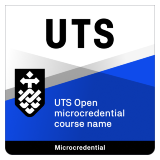This course has been designed to provide you with an applied introduction to the field of machine learning, and an orientation to its different usages. It has been designed by the UTS Faculty of Engineering and Information Technology, leveraging the faculty's unique expertise in the area of artificial intelligence.
In this course you will meet (virtually) and work with a dedicated course facilitator, who supports your learning and engagement with the teaching resources designed by the lead academic and a team of experts from the Faculty of Engineering and Information Technology at UTS.
There are five modules, each featuring self-study materials and facilitated online sessions:
1. Machine learning problems
This introductory module will provide you with both a theoretical background of machine learning problems as well as ensure you are refreshed on the basic mathematical formulas used in defining machine learning problems.
2. Linear models
In this module we introduce the linear family of hypotheses, which are widely used in machine learning. The basic idea is that the target of interest is linked to a weight sum of all the data attributes. This module introduces the use of linear models, perceptron models, how to train perceptron models, and implementation of linear models.
3. Decision trees
We will look at how a decision tree works to produce the target value from the attributes and cover elements of the information theory that underlies and motivates the development of decision trees. We introduce the ID3 decision tree training algorithm.
4. Evaluation, error and noise
This module covers the criteria employed in the selection and optimisation process. We cover the loss function for training, the difference between training (in-sample) and generalisation (out-sample) errors, and noise.
5. Ensemble methods
In this module, you are introduced to the idea of putting multiple learned data models together to make a complex and more powerful model. We cover resampling (bootstrapping), bagging and random forest methods, and the adaboost algorithm.
Scheduling
This course is delivered in a scheduled format over ten weeks.
Each week (during weeks 1 to 8) you will participate in an online session where you will have the chance to apply what you've learned, ask questions and hear from other participants who are taking the course with you. The workshops are led by the course facilitator.
Weeks nine and ten are planned to give you time to complete the final assignment, with support and scheduled Q&A sessions provided.
Course delivery
The course will include both theoretical and practical components. The theory will provide a systematic view of the whole life cycle of a data model, from the design motivation to the dynamics in the learning process, the evaluation and how reliable the evaluation results are. On the practical side, participants will be led to translate math notions into data structures and programs in a digital computer, which allows them to ‘open the hood’ of the data models and get hands-on experience through examining piece-by-piece how the models perform learning.
The course presentation includes weekly, synchronous one-hour online workshops facilitated by expert UTS academics supporting self-study and online learning activities. Regular formative quizzes throughout the course will allow participants to gauge their progress.

















